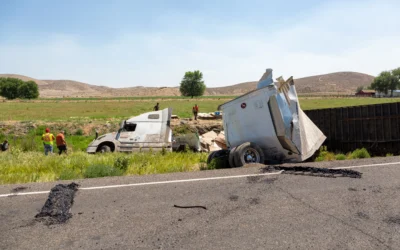Your Path to Fair Compensation in Nevada
When an accident turns your life upside down, the last thing on your mind is paperwork. Yet the moments following an injury are some of the most important for building a strong legal case. Every photograph not taken, every medical visit skipped, and every piece of evidence overlooked can become a roadblock to the compensation you deserve.
In Nevada’s legal system, your case lives or dies by the strength of your documentation. Insurance companies and defense attorneys will scrutinize every detail of your claim, looking for gaps they can exploit to minimize your settlement. The difference between a successful recovery and a denied claim often comes down to how well you’ve documented your injuries from day one.
Why Proper Documentation Matters in Nevada Personal Injury Cases
Nevada operates under a comparative negligence system, which means your compensation can be reduced by your percentage of fault in an accident. Nevada follows a comparative negligence system, which means that even if the victim bears some responsibility, they can still recover damages. This makes thorough documentation even more important because it helps establish the full extent of your injuries and the other party’s liability.
Under Nevada Revised Statutes § 11.190, you have only two years from the date of your injury to file a personal injury lawsuit. This statute of limitations creates urgency around documentation – waiting too long to seek medical treatment or gather evidence can harm your case irreparably.
The burden of proof in Nevada personal injury cases rests on your shoulders. You must demonstrate that another party’s negligence caused your injuries and resulted in specific damages. Without proper documentation, proving these elements becomes nearly impossible.
What Should You Document After an Injury?
Medical Documentation: The Foundation of Your Case
Medical records form the backbone of any personal injury claim in Nevada. The health care record of a person must be maintained for 5 years, after it has been received or created, unless federal law requires that it be retained for a longer period of time according to Nevada law, giving you access to these crucial documents for your case.
Your medical documentation should include:
- Initial Emergency Treatment Records: Even if you feel fine immediately after an accident, seek medical attention. Adrenaline and shock can mask pain and injury symptoms. Emergency room visits, ambulance records, and initial diagnostic tests create a medical timeline that connects your injuries directly to the incident.
- Diagnostic Test Results: X-rays, MRIs, CT scans, and other imaging studies provide objective evidence of your injuries. These tests create visual proof that’s difficult for insurance companies to dispute. Keep copies of all test results and images.
- Treatment Records: Document every medical appointment, physical therapy session, and treatment you receive. This includes prescription medications, medical devices, and any recommended lifestyle modifications. The consistency of your treatment shows the ongoing nature of your injuries.
- Medical Bills and Insurance Claims: Financial documentation proves the economic impact of your injuries. Save every bill, insurance explanation of benefits, and payment receipt. These documents establish your special damages – the quantifiable financial losses from your injury.
Physical Evidence and Visual Documentation
- Photographs of Your Injuries: Take pictures of your injuries immediately after the accident and throughout your recovery. Photos should show the progression of bruising, swelling, scarring, and healing. Date and time stamp these images when possible.
- Accident Scene Documentation: If you’re able, photograph the accident scene, property damage, hazardous conditions, and any relevant environmental factors. Weather conditions, lighting, and road conditions can all play a role in establishing liability.
- Property Damage Evidence: Document damage to your vehicle, personal belongings, or other property. This evidence helps establish the severity of the impact and supports your injury claims.
Daily Life Impact Documentation
- Pain and Symptom Journal: Keep a daily record of your pain levels, symptoms, and how your injuries affect your daily activities. Rate your pain on a scale of 1-10 and describe specific limitations. This creates a detailed record of your suffering that complements medical documentation.
- Work Impact Records: Document missed work days, reduced work capacity, and any accommodations needed due to your injuries. Save communications with your employer about your condition and any lost wages or benefits.
- Activity Limitations: Record activities you can no longer perform or must modify because of your injuries. This includes household chores, hobbies, exercise routines, and social activities. These limitations contribute to your pain and suffering damages.
How to Organize Your Documentation
Create a Comprehensive File System
Organize your documents chronologically and by category. Create separate sections for medical records, photographs, correspondence, financial documents, and legal papers. This organization helps your attorney quickly locate specific information and demonstrates your commitment to your case.
- Digital Backup Strategy: Scan all physical documents and store them in cloud-based storage. Create multiple backups to prevent loss of crucial evidence. Many insurance companies and opposing counsel will request electronic copies of documents during litigation.
- Document Authentication: For your documents to be used in court, they must be properly authenticated. This usually means showing that the records are genuine and haven’t been altered. Your attorney can ensure this process is handled correctly, especially when subpoenaing medical or employment records.
Maintaining Consistent Records
Consistency in your documentation strengthens your credibility. Regular entries in your pain journal, consistent medical treatment, and continuous communication with healthcare providers show that your injuries are genuine and ongoing. Gaps in treatment or documentation can be used against you by opposing counsel.
- Treatment Compliance: Follow all medical advice and attend all appointments. Insurance companies often argue that gaps in treatment indicate your injuries weren’t serious. Even if you feel better, continue treatment as recommended by your healthcare providers.
- Communication Records: Save all communications with insurance companies, healthcare providers, and other parties involved in your case. This includes emails, letters, and notes from phone conversations. These records can prevent disputes about what was said or agreed upon.
Common Documentation Mistakes to Avoid
Delayed Medical Treatment
One of the most damaging mistakes is waiting too long to seek medical care. Insurance companies argue that delayed treatment indicates your injuries weren’t serious or were caused by something other than the accident. Seek medical attention immediately, even if you feel fine initially.
Incomplete Medical History Disclosure
Failing to disclose pre-existing conditions or prior injuries can destroy your credibility. Nevada’s comparative negligence system already accounts for pre-existing conditions – hiding them only makes your case weaker. Be honest with your healthcare providers and attorney about your complete medical history.
Social Media Pitfalls
Insurance companies and defense attorneys regularly monitor social media profiles of injury claimants. Photos showing physical activities inconsistent with your claimed limitations can devastate your case. Consider temporarily deactivating social media accounts or severely limiting posts during your case.
Inadequate Photo Documentation
Taking too few photos or waiting too long to photograph your injuries weakens your case. Bruising and swelling may not appear immediately, but they should be documented as soon as they become visible. Continue photographing your injuries throughout the healing process.
When to Involve Legal Counsel
Nevada’s legal system contains numerous pitfalls for unrepresented individuals. The state’s comparative negligence rules, complex insurance regulations, and strict procedural requirements make professional legal representation valuable for most injury cases.
An experienced personal injury attorney can help you identify and preserve crucial evidence, communicate with insurance companies, and build a comprehensive case for compensation. They also have access to medical professionals, accident reconstruction specialists, and other experts who can strengthen your documentation.
Early legal involvement is often beneficial because attorneys can guide your documentation efforts from the beginning. They know what evidence will be most valuable and can help you avoid common mistakes that damage cases.
Working with Healthcare Providers
Maximizing Medical Documentation
Build strong relationships with your healthcare providers and communicate openly about how your injuries affect your daily life. Many patients minimize their symptoms during medical appointments, which can hurt their legal cases. Be specific about your pain levels, limitations, and concerns.
Ask your healthcare providers to document specific limitations and restrictions in your medical records. Statements like “patient reports difficulty lifting objects over 10 pounds” or “patient unable to stand for more than 30 minutes” provide concrete evidence of your functional limitations.
Obtaining Medical Records
Nevada Revised Statutes § 629.061 governs access to medical records. Each provider of health care shall make the health care records of a patient available for physical inspection by: (a) The patient or a representative with written authorization from the patient. This gives you the right to obtain copies of all your medical records.
Request complete copies of your medical records regularly throughout your treatment. Don’t wait until your case is ready for settlement to gather these documents – some records may be harder to obtain as time passes.
Technology and Documentation
Digital Documentation Tools
Modern smartphones and tablets make documentation easier than ever. Use apps to photograph injuries, track symptoms, and organize documents. Many pain tracking apps allow you to record daily pain levels, medications, and activities, creating a comprehensive digital record.
Voice recording apps can help you document the circumstances of your accident while details are fresh in your memory. These recordings can serve as reference material when preparing your legal case.
Cloud Storage and Security
Store all digital documentation in secure cloud storage with proper backup procedures. Ensure your storage solution provides adequate security to protect sensitive medical and legal information. Consider using services that offer legal-grade security and retention policies.
The Role of Expert Witnesses
Medical Experts
In complex injury cases, medical experts may be necessary to explain your injuries and their long-term implications. Proper documentation supports expert testimony by providing detailed records of your condition and treatment.
Your documentation should include information about functional limitations, future medical needs, and the relationship between your injuries and the accident. This information helps medical experts form opinions about your case.
Economic Experts
Economic experts calculate the financial impact of your injuries, including lost wages, reduced earning capacity, and future medical expenses. Your documentation of work limitations, medical expenses, and lifestyle changes provides the foundation for these calculations.
Long-term Consequences and Future Damages
Documenting Ongoing Effects
Many injuries have long-term consequences that aren’t immediately apparent. Continue documenting your condition even after initial treatment ends. Ongoing pain, limited mobility, and reduced quality of life are all compensable damages in Nevada personal injury cases.
Regular follow-up appointments with healthcare providers help document the long-term effects of your injuries. These appointments create a medical record showing how your injuries continue to affect your life months or years after the accident.
Future Medical Needs
Work with your healthcare providers to document likely future medical needs related to your injuries. This might include ongoing physical therapy, future surgeries, or long-term medication needs. These future damages can represent a significant portion of your total compensation.
Key Takeaways
- Start documenting immediately after your injury occurs, even if you feel fine initially.
- Seek medical attention promptly and follow all treatment recommendations consistently.
- Photograph your injuries throughout the healing process and maintain detailed records.
- Keep comprehensive records of all expenses, lost wages, and daily life impacts.
- Be honest about pre-existing conditions and provide complete medical histories.
- Avoid social media posts that could contradict your injury claims.
- Organize documents systematically and create digital backups.
- Work with experienced legal counsel to ensure proper documentation and case development.
- Continue documenting long-term effects and future medical needs.
- Remember Nevada’s two-year statute of limitations for personal injury cases
Frequently Asked Questions
How long do I have to file a personal injury claim in Nevada? Nevada law provides a two-year statute of limitations for personal injury cases under NRS § 11.190. This means you must file your lawsuit within two years of the date your injury occurred. Waiting longer than this generally results in losing your right to seek compensation through the courts.
What if I can’t afford medical treatment after my accident? Don’t let financial concerns prevent you from seeking necessary medical care. Many healthcare providers work with personal injury attorneys on a lien basis, meaning they’ll wait for payment until your case settles. Some providers also offer payment plans or reduced rates for uninsured patients.
Should I give a recorded statement to the insurance company? Generally, you should avoid giving recorded statements to insurance companies without consulting an attorney first. Insurance adjusters are trained to ask questions that can be used to minimize your claim. You’re typically only required to cooperate with your own insurance company under your policy terms.
Can I still recover compensation if I was partially at fault for my accident? Yes, Nevada follows a comparative negligence system that allows you to recover compensation even if you were partially at fault. However, your compensation will be reduced by your percentage of fault. For example, if you were 20% at fault, your compensation would be reduced by 20%.
How important are witness statements for my case? Witness statements can be extremely valuable, especially in cases where liability is disputed. Get contact information for any witnesses immediately after your accident. Their statements can provide objective accounts of what happened and support your version of events.
What should I do if the insurance company denies my claim? If an insurance company denies your claim, don’t accept their decision as final. Insurance companies sometimes deny valid claims hoping claimants will give up. An experienced attorney can review the denial, challenge improper decisions, and help you pursue other options for compensation.
Contact Joey Gilbert & Associates Today
Don’t let poor documentation weaken your personal injury case. The attorneys at Joey Gilbert & Associates have extensive experience helping Nevada residents document their injuries properly and build strong cases for maximum compensation. We understand Nevada’s personal injury laws and know what evidence insurance companies and courts find most compelling.
Our team can help you through every step of the documentation process, from organizing your medical records to working with healthcare providers and professionals. We’ll help you avoid common mistakes that could harm your case and ensure you have the strongest possible foundation for recovery.
Time is critical in personal injury cases. Nevada’s two-year statute of limitations means you can’t afford to wait. Contact Joey Gilbert & Associates today to schedule your free consultation and start building your case the right way. We’re here to fight for the compensation you deserve while you focus on your recovery.
Remember, you don’t pay attorney fees unless we win your case. Don’t let insurance companies take advantage of you – get experienced legal representation on your side from the beginning.




